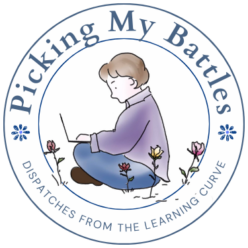Thing1 is being punished. He’s being really punished for the first time in recent memory.
For most of the last twelve years we’ve been pretty lucky. For most of that time, he’s been good-natured and willing to follow the rules we set down. Infractions occur of course, but for the most part, they’ve been small enough that an empty, humorous threat to send him to military school puts a stop to restaurant antics or begging. When we do lay down the law, Thing1 usually plays the part of the gentle giant tolerating a well-meaning but misdirected mother and goes along. He seems to understand that – even when he thinks we’re totally nuts – we’re on his side.
That all changed today, as the fallout from a less-than-stellar report card caused the first serious fissure in his faith in our good intentions.
All kids have an Achilles heel as individual as their personalities, and Thing1’s is his love of all things computer. He has begun cracking open code on favorite games and spending hours Skyping with friends, gabbing about hardware and how to improve their favorite video game and which is the best OS for their purposes. It is a hobby and avocation that could be come a vocation. Now, however, it is bordering on addiction. So, fifteen minutes after the Big Guy and I read the report card, we had an intervention and pulled the plug.
Our normally tolerant twelve-year-old reacted like any addict who was being cut off would. He denied. Then he rationalized – the report card, that is. Then he protested. And finally, grudgingly he accepted the reality that his computer time would be restricted to school work.
Grudging acceptance has now taken the form of the silent treatment. He still obeys the easy rules without defiance. Gone, however, is the good-natured demeanor. Smiles are quickly extinguished when we make eye contact – even if we caused the smile. From his room, we can occasionally hear muted muttering that tells us we hit that heel with perfect aim.
At first we did pat ourselves on the back for being such clever parents. We felt guilty for about 10 seconds after we shutdown his favorite hobby, but, contrary to his belief, we’re not enjoying our victory. I know he needs the consequences, but I hate seeing him unhappy. I know there are things we can control in our own house and there things we can’t. This is one of the things we’re supposed to control. And while it hasn’t lead to happiness, it is giving me a bit of serenity in a way that I would never have thought possible when I was a teenager.
As the bearer of numerous crappy report cards, I was also the recipient of many groundings (pointless and redundant for Thing1 who lives in the middle of the woods) and privilege losses. I remember the profound sense of betrayal when I lost a favorite social outlet. Now, walking this mile in my parents’ moccasins, I’m finding yet another new understanding of their perspectives. There’s no forgiveness, of course – there’s nothing to forgive when someone’s looking out for your future. Instead, this is one of those moments when my mom and dad are getting a unexplained warm feeling in the back of their necks as their daughter writes that they were right about many things – even when it wasn’t fun to be right.










